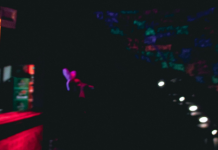Trent Reznor and Saul Williams seem at first glance an unlikely duo. Most of Reznor’s oeuvre consists of highly introspective albums filled with angry and beautiful soundscapes, solipsistic even. His music in the past has been accused of being apolitical and nihilist. Saul Williams, on the other hand, has blazed a career as a poet of politics and the present moment. His albums and many performances have dealt with issues of race, class, capitalism and war, in addition to the mundane.
Over the past year they have produced two albums of profound importance. Nine Inch Nail’s (NIN) Year Zero is premised as a musical message from the future, a time when a totalitarian regime has overtaken America and turned the powers of the police state against its own people. The empire is growing within and without. Saul William’s Niggy Tardust, a collaboration between both artists (produced by Reznor), is set more in the present, but draws many equally fearsome conclusions on society. Both albums are sonic geographies of fear, violence, and resistance. Both are worth listening to in tandem as diagnostics: they sing about America, it’s possible futures and its shameful presents.
Reznor’s Year Zero sounds off as a holistic narrative that is thoroughly political from the first track to last. The album opens with “Hyperpower,†a song that begins with fascistic chants echoing into a crescendo of terrified screaming, boot marching, and what can only described in print as the sound of catastrophe. Year Zero is full of explosively violent beats and shrill ruptures of sound, but Reznor has balanced his pessimism with equally hopeful messages about resistance against militarism and the state.
In “Good Soldier†he describes scenes of death and destruction – “blood, fire in the street†– then singing as though from the vantage of the soldiers themselves, “I am trying to see/I am trying to believe/this is not where I should be/I am trying to believe.†The album’s last track is an impressive manifesto of sound and words against empire, consumerism, and the American culture of war. Reznor’s shrill and soft voice utters over the dissonant track that, “…in our hearts we knew better/and we told ourselves it didn’t matter/and we chose to continue.†There are many things we the American people know better about, but allow to continue. Perhaps we’re afraid, cynical, or feel powerless? The song’s final chord progression moves from a strange minor to something that sounds possible, hopeful, but the poetry indicts us.
Niggy Tardust appears to be set in the present, but this is a present many of us are unfamiliar with. If Reznor is appealing to his mostly white middle class fans to “wake up,†then Williams is spitting out poetry to a people far too disenfranchised to have any dreamy allusions about the United States. William’s lyrics and Reznor’s beats aim at the underbelly of society, to the margins and cracks inhabited by the poor, communities of color, immigrants, and the homeless. Tracks like Tr(n)igger dive head first into tropes of racism and violence. Williams screams, “the trigger is you!/the nigger is you!/so what you gonna do?!†Williams poetry is vastly more complex than Reznor’s lyrics, but with the backing of NIN’s front man on the boards, Niggy Tardust is a deep and thought provoking album on all levels.
In the first video released off Niggy Tardust, “Sunday, Bloody Sunday,†Williams tramps through a dystopic Los Angeles, a homeless man cleaning windshields for spare change with his squeegee. Crucified on the squeegee is a small golden Jesus. As a cover of U2’s original, Sunday Bloody Sunday in Williams and Reznor’s hands takes on a whole new meaning. The Los Angeles portrayed in the video is real and present, not the future horrors that Year Zero warns us of. Horrific suffering is already here. The fear and frustration so evident in William’s voice is a feeling millions of Americans know.
In the past Williams has warned critics from reading too much into his lyrics, to pay more attention to the polyrhythm and melodies that back his vocal performances. Taking his poetry as equal part in the sonic beats on an album accompanied by a considerable amount of visual arts and performance work, Niggy Tardust is a complex and multi-themed piece of art. It stretches far beyond the aims of Year Zero. And yet the two albums fit together coherently. It’s not a matter Reznor’s signature production on each. Year Zero reads like a missive from a future world in which we have done too little to avoid ecological collapse and the rise of a totalitarian society. Year Zero warns us of a dystopian future. Niggy Tardust is grounded in a present, one that’s all too real in sound and emotion, one that is segue into Year Zero.
Saul Williams will perform on March 22nd at Velvet Jones in downtown Santa Barbara.











